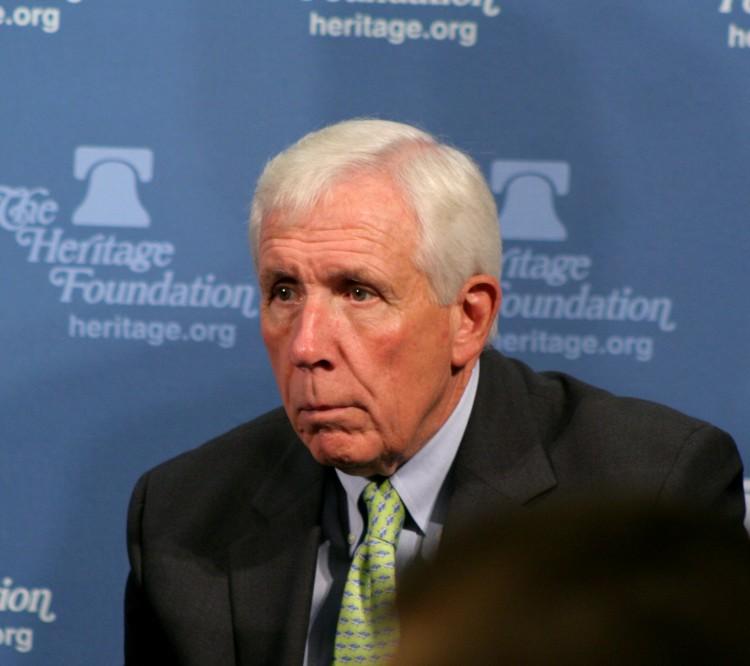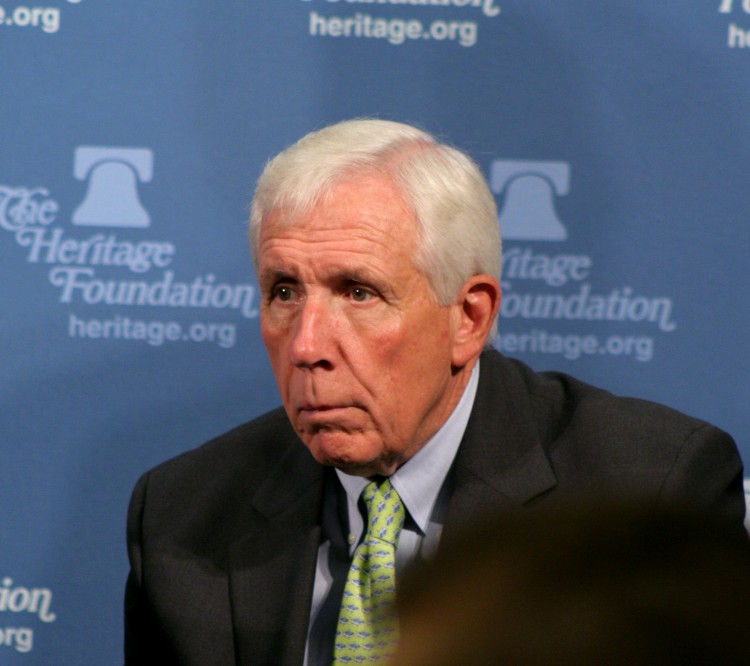WASHINGTON—Virginia Congressman Frank Wolf is passionate about human rights and religious freedom. Stating that his faith and principles require him to be a voice for the oppressed, the Republican representative has gone to some very dangerous places in the world, experiencing firsthand Ceausescu’s Romania and communist China’s repression of Tibetan culture.
In places where his status as a U.S. congressman meant no guarantee of personal safety, Wolf traveled anyway, determined to make a difference in ending evil and tyranny.
Frank Wolf spoke at the Heritage Foundation on Jan. 12 about the release of his new book “Prisoner of Conscience: One Man’s Crusade for Global Human and Religious Rights.”
While the book is an account of his concern for those persecuted around the world, he says he wasn’t a crusader for human rights when he entered Congress, representing Virginia’s 10th District, in 1981.
The son of a policeman, he grew up in a tough area of Philly, with poor grades and a stutter, and was an unlikely person to become an elected public figure. After failing twice to win a Congressional seat, he finally won the third time, after withdrawing his life savings and campaigning for about a year, and, he adds, by riding the Reagan coattails.
Having focused on transportation issues during his inaugural campaign, Wolf states that although he didn’t come to Congress interested in human rights, two trips profoundly changed the course of his life.
Wolf became aware in 1984 of the devastating famine in Ethiopia, where nearly one million had perished. His friend and colleague, Ohio Democratic Congressman Tony Hall, said he had to travel to Africa and witness the crisis for himself, and needed a cosponsor for food aid. So Wolf went along.
The impact was life-changing. “Inside Prisoner of Conscience” is a photo of Congressman Wolf holding a dying baby in his arms. In the image, Wolf is surrounded by thousands of starving people, the bloated bellies of the children and suffering faces of their mothers evident.
Later on in his career, Wolf would return to Ethiopia in 2003, when famine struck once again. The experience made him determined to “draw attention to the issue and re-energize the global community.”
Although suffering under a bad economy, not starvation but religious persecution was the human rights issue in Romania in the late 1980s. The communist regime under Nicolas Ceausescu was persecuting Christians, imprisoning pastors, while worshipers risked being beaten, tortured, or imprisoned.
There’s a scene described in Wolf’s book where he and New Jersey Congressman Chris Smith are nearly run over by the secret police, who at a minimum wanted to scare them, and maybe worse.
When he returned to Congress, Wolf was determined to revoke Romania’s most favored trade nation status (MFN).
It was hard to convince other representatives and senators to remove the MFN status. According to his account, if others had traveled to Romania, they hadn’t seen the situation or spoken to the people like he, Smith, and Hall had.
Wolf said his small band of congressmen finally “wore down” their colleagues and got the MFN suspended for six months in 1988, despite strong lobbying from businesses. Then-President Ronald Reagan agreed to the suspension as well.
Wolf said on the floor of the House that “millions of Romanian citizens knew for the first time, after twelve long years, that finally the U.S. Congress cares very deeply about them.” He said that dissidents later told the group that the U.S. Congressmen’s fighting for them greatly encouraged them.
Such support of the dissidents’ hopes was a lesson Wolf often mentions.
In both cases, Wolf attributes the trips to Ethiopia and Romania as awakening him to the suffering of other people. “As both a U.S. congressman and a Christian, I knew I had to do something about it.”
China
Rep. Wolf describes the brutality of China’s communist regime like many others have, but what makes the account compelling are his personal experiences in China.
In March of 1991, he and Rep. Smith visited China and were able to see Beijing’s Prison Number One, where they found Tiananmen Square demonstrators forced to work as laborers in a hosiery factory. Some of the products made by slave labor had made their way to the West, Wolf said, and he personally came back with a pair of golf socks, which could not be purchased in China at the time.
Upon return, both congressmen failed to persuade their colleagues to withdraw MFN status for China, and were told that such a stance would harm America’s economic interests, the United States would lose influence.
Nearly two decades later in 2008, Rep. Wolf tried hard to persuade Republican and fellow Christian, President George W. Bush, to not “legitimize China’s barbarous regime by attending the opening ceremonies of the [Olympic] Games,” but was unsuccessful.
He was also disappointed when newly appointed Secretary of State Hillary Clinton, on her first trip to China, stated that human rights would not be a priority in her discussions with the regime over the ongoing economic and global crises.
In 2006, Rep. Wolf, along with 16 other congressional members, had their computers hacked. An FBI investigation determined the origin of the attack to be mainland China, with strong suspicions that the hackers were most likely backed by the communist regime. He states that every human rights case he handled—and information on the dissidents he contacted—were compromised in the breach.
Digging further into human rights abuses, Wolf had heard accounts of Chinese repression in Tibet, including torture of monks and nuns and Tibetans being thrown in prison for the crime of possessing a picture of the Dalai Lama.
In 1997, he wanted to see for himself what was going on in Tibet, but was not allowed to visit China because of his past criticisms of the regime; trying to procure a visa to Tibet would have been impossible.
So, Wolf decided to sneak into the region “undercover,” traveling as a typical tourist. And the disguise worked.
Once in country, Wolf was able to see with his own eyes what the Chinese regime was doing to Tibet. He traveled to the prisons, where hundreds of political prisoners were held in inhumane conditions.
Wolf was skeptical that anyone would dare talk to him, fearing imprisonment—or worse—but several did open up, sharing their grievances. Tibetans told him that they had no rights, and their culture was being eviscerated.
“Every monastery was tightly controlled by a small cadre of resident Chinese public security police,” Wolf learned.
When he returned to the States, he spoke at a press conference, explaining that Chinese communists were “systematically destroying the very fabric of Tibetan society.”
To this day, Wolf says he is disappointed that his Republican colleagues don’t speak out more about the oppression of Tibetans. While Ronald Reagan spoke of human freedom, according to Wolf when he attends freedom for Tibet events, “most of the participants are Democrats.”
Reagan Was Different
Reflecting on the Reagan era, Wolf laments the retreat of human rights discourse from America’s foreign policy, in words and in actions.
Speaking on China, the congressman mentions in one breath: 25 Catholic bishops under house arrest; hundreds of Protestant pastors arrested; Falun Gong being brutalized; 11 to 13 Buddhists setting themselves aflame in protest; and the presence of Chinese security police monitoring every Tibetan monastery.
Wolf stated with righteous indignation that in Sudan, 2.1 million Christians, Muslims, and others have been killed. “They are bombing—bombing—bombing [loud voice] refugee camps where there are thousands of men and women living, and no one cares.”
The Virginia congressman has on-the-ground experience in the troubled African nation, visiting five times since 1989.
Wolf continued. “[Sudanese President Omar] al-Bashir is an indicted war criminal.” Yet, the Obama administration “allowed him to have a Washington representative lobbyist in town. No administration ever allowed that to take place.”
“The Republicans and this administration are not looking into these issues,” he said. In Reagan’s time, “The embassies were islands of freedom in those days.”
“You can do it in an appropriate way; you can say ’tear down this wall,'” Wolf argued. Even though Reagan referred to Soviet Russia as an evil empire, Gorbachev attended his funeral, noted Wolf.
“Reagan still talked to them. You'd meet with a Russian counterpart, [and] always [the] first question out was to advocate and give them a list. Now the list is a list of businesses ... rather than a list of dissidents.”
Wolf often repeats in his book and at Heritage that Reagan believed that the U.S. Constitution was a covenant with the entire world. The words in the Declaration of Independence that all men are created equal and “endowed by their Creator with certain inalienable rights” were “not written just for the American people,” writes Wolf.
“America used to be the beacon and I want us to be the beacon again,” the congressman stated.
The world is looking to us, says Wolf, and “if we look away, we will no longer be the Shining City on a Hill.”







